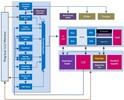Intel HD Graphics (Ivy Bridge) vs Intel UHD Graphics 610
Intel HD Graphics (Ivy Bridge)
► remove from comparison
Die Intel HD Graphics ist eine in den Ivy Bridge Prozessoren integrierte Grafikkarte. Sie kommt in den mobilen Celeron- und Pentium-Modellen zu Einsatz. Im Vergleich zur stärkeren Intel HD Graphics 4000, ist die HD Graphics deutlich abgespeckt und bietet weniger Execution Units (6 EUs) und Texture Sampler (nur einer). Daher ist die Performance deutlich geringer und liegt nur etwas oberhalb der alten Intel HD Graphics 2000. Je nach Prozessor weist die HD Graphics eine unterschiedliche Basis- und Turbo-Taktrate auf.
Da die Leistung nur zwischen der HD Graphics 2000 und 3000 liegt, ist die Ivy Bridge GT1 nur für ältere und anspruchslose Spiele ausreichend. Intel selbst gibt eine Geschwindigkeit 10-15% über der alten HD Graphics 2000 in Sandy Bridge CPUs an. Unsere Benchmarks (siehe weiter unten) zeigen eine Performance auf dem Niveau integrierter Einstiegslösungen von AMD wie der Radeon HD 8210.
Eine Besonderheit der Ivy Bride Grafikkerne ist, dass nur 4x MSAA von der Hardware unterstützt wird. 2x MSAA wird per Software berechnet und geht durch die 4x MSAA Pipeline. Daher empfiehlt sich der Einsatz des gleich schnellen 4x MSAA.
Auch der integrierte Videodecoder genannt Multi Format Codec Engine (MFX) wurde kräftig überarbeitet und soll nun sogar mehrere 4K Videos parallel dekodieren können (ev. nur in den High-End Modellen). DXVA Checker gibt weiterhin die Formate MPEG2, VC1, WMV9 und H264 als unterstützt an. QuickSync zum schnellen Transkodieren von Videos wurde ebenfalls verbessert und soll nun schneller bei gleichzeitig höherer Qualität laufen.
Ebenfalls neu ist die Unterstützung für drei unabhängige Bildschirme. Bis Sandy Bridge waren nur zwei möglich und lediglich die AMD Grafikkarten mit Eyefinity Support bieten mehr als zwei Anschlüsse für Notebooks (jedoch nur mit DisplayPort).
Aufgrund der Integration in den mit 22nm gefertigten Prozessor und die halbierte Shaderzahl ist der Stromverbrauch relativ gering und eignet sich auch für flache und kleine Notebooks.
Intel UHD Graphics 610
► remove from comparison
Die Intel UHD Graphics 610 (GT1) ist eine Prozessorgrafikkarte in den schwächeren Pentium Modellen (z.b. Whiskey Lake basierter Pentium Gold 6405U). Im Vergleich zur älteren HD Graphics 610 (z. B. in Kaby-Lake Pentium CPUs), wurde nur der Name geändert. Zwar glänzt die GPU mit einer niedrigen Leistungsaufnahme, allerdings siedelt sich die Performance nur im Low-End-Segment an und ist für neuere Spiele selten ausreichend. Als sogenannte GT1-Ausbaustufe der verfügt die UHD Graphics 610 über 12 Execution Units (EUs), die je nach Modell mit bis zu 950 MHz takten.
Mangels eigenem Grafikspeicher oder eDRAM-Cache greift die HD Graphics 610 über das Interface des Prozessors auf den System-RAM zu (2x 64 Bit DDR4-2133/DDR3L-1600/LPDDR3-1866).
Performance - Nur wenige Spiele laufen flüssig
Die Leistung der UHD Graphics 610 ist vergleichbar mit der identischen HD Graphics 610 und sehr ähnlichen HD Graphics 510 und dadurch nur für sehr anspruchslose Spiele geeignet. Farming Simulator 17, World of Warships oder Dota 2 Reborn sind z.B. Spiele die in niedrigster Detailstufe spielbar sein sollten.
Features - H.265 in Hardware
Anders als Skylake kann Kaby Lake und dere Nachfolger nun auch H.265/HEVC im Main10-Profil mit 10 Bit Farbtiefe sowie Googles VP9-Codec in Hardware decodieren. Die Kaby-Lake Pentium Modelle sollten auch schon HDCP 2.2 unterstützen, was beispielsweise für die Ausgabe von Netflix-Videos in 4K benötigt wird. HDMI 2.0 unterstützt die HD Graphics 620 jedoch weiterhin nur per Wandler (LSPCon) über den DisplayPort.
Leistungsaufnahme
Die TDP des gesamten Chips liegt standardmäßig bei 15 Watt, sodass die GPU vor allem in Ultrabooks oder oder schlanken Notebooks zu finden ist. Teils kann die TDP auch auf 10 Watt abgesenkt werden, wodurch allerdings die Performance sinkt.
| Intel HD Graphics (Ivy Bridge) | Intel UHD Graphics 610 | ||||||||||||||||||||||||||||||||||||||||||||||||||||||||||||||||||||||||||||||||||||||||||||||||||||||||||||||||
| Gen. 9 Serie |
|
| |||||||||||||||||||||||||||||||||||||||||||||||||||||||||||||||||||||||||||||||||||||||||||||||||||||||||||||||
| Codename | Ivy Bridge GT1 | Kaby Lake GT1 | |||||||||||||||||||||||||||||||||||||||||||||||||||||||||||||||||||||||||||||||||||||||||||||||||||||||||||||||
| Architektur | Gen. 7 Ivy Bridge | Gen. 9 Kaby Lake | |||||||||||||||||||||||||||||||||||||||||||||||||||||||||||||||||||||||||||||||||||||||||||||||||||||||||||||||
| Pipelines | 6 - unified | 12 - unified | |||||||||||||||||||||||||||||||||||||||||||||||||||||||||||||||||||||||||||||||||||||||||||||||||||||||||||||||
| Kerntakt | 350 - 1100 (Boost) MHz | 300 - 950 (Boost) MHz | |||||||||||||||||||||||||||||||||||||||||||||||||||||||||||||||||||||||||||||||||||||||||||||||||||||||||||||||
| Speicherbandbreite | 64/128 Bit | 64/128 Bit | |||||||||||||||||||||||||||||||||||||||||||||||||||||||||||||||||||||||||||||||||||||||||||||||||||||||||||||||
| Shared Memory | ja | ja | |||||||||||||||||||||||||||||||||||||||||||||||||||||||||||||||||||||||||||||||||||||||||||||||||||||||||||||||
| API | DirectX 11.0, Shader 5.0 | DirectX 12_1, OpenGL 4.4 | |||||||||||||||||||||||||||||||||||||||||||||||||||||||||||||||||||||||||||||||||||||||||||||||||||||||||||||||
| Herstellungsprozess | 22 nm | 14 nm | |||||||||||||||||||||||||||||||||||||||||||||||||||||||||||||||||||||||||||||||||||||||||||||||||||||||||||||||
| Erscheinungsdatum | 01.10.2012 | 01.01.2019 | |||||||||||||||||||||||||||||||||||||||||||||||||||||||||||||||||||||||||||||||||||||||||||||||||||||||||||||||
| Speichertyp | DDR3/DDR4 | ||||||||||||||||||||||||||||||||||||||||||||||||||||||||||||||||||||||||||||||||||||||||||||||||||||||||||||||||
| Features | QuickSync |
|
| ||||||||||||||||||||||||||||||||||||||||||||||||
Benchmarks
3DM Vant. Perf. total + Intel HD Graphics (Ivy Bridge)
specvp11 snx-01 + Intel HD Graphics (Ivy Bridge)
Cinebench R15 OpenGL 64 Bit + Intel UHD Graphics 610
GFXBench T-Rex HD Offscreen C24Z16 + Intel HD Graphics (Ivy Bridge)
Average Benchmarks Intel HD Graphics (Ivy Bridge) → 100% n=17
Average Benchmarks Intel UHD Graphics 610 → 265% n=17
* Smaller numbers mean a higher performance
1 This benchmark is not used for the average calculation
Spiele-Benchmarks
Die folgenden Benchmarks basieren auf unseren Spieletests mit Testnotebooks. Die Performance dieser Grafikkarte bei den gelisteten Spielen ist abhängig von der verwendeten CPU, Speicherausstattung, Treiber und auch Betriebssystem. Dadurch müssen die untenstehenden Werte nicht repräsentativ sein. Detaillierte Informationen über das verwendete System sehen Sie nach einem Klick auf den fps-Wert.

F1 2021
2021
F1 2020
2020
Gears Tactics
2020
Doom Eternal
2020
Hunt Showdown
2020
Hearthstone
2020
Need for Speed Heat
2019
Dirt Rally 2.0
2019
Far Cry New Dawn
2019
Battlefield V
2018
Far Cry 5
2018
X-Plane 11.11
2018
Rocket League
2017
Rainbow Six Siege
2015
Dota 2 Reborn
2015
The Witcher 3
2015
GTA V
2015
Thief
2014
X-Plane 10.25
2013
F1 2013
2013
Fifa 14
2013
Dota 2
2013
GRID 2
2013
Metro: Last Light
2013
BioShock Infinite
2013
Tomb Raider
2013
Dead Space 3
2013
Hitman: Absolution
2012
Dishonored
2012
Fifa 13
2012
F1 2012
2012
Guild Wars 2
2012
Counter-Strike: GO
2012
Dirt Showdown
2012
Diablo III
2012
Anno 2070
2011
Fifa 12
2011
Dirt 3
2011Average Gaming Intel HD Graphics (Ivy Bridge) → 100%
Average Gaming 30-70 fps → 100%
Average Gaming Intel UHD Graphics 610 → 132%
Average Gaming 30-70 fps → 124%
| Intel UHD Graphics 610 | low | med. | high | ultra | QHD | 4K |
|---|---|---|---|---|---|---|
| F1 2021 | 19.7 | 7.88 | 6.26 | |||
| F1 2020 | 17.6 | 7.54 | 5.5 | |||
| Gears Tactics | 15.5 | |||||
| Doom Eternal | ||||||
| Hunt Showdown | 8.59 | |||||
| Hearthstone | 30.4 | 21.9 | ||||
| Star Wars Jedi Fallen Order | 7.74 | |||||
| Need for Speed Heat | 8 | |||||
| Ghost Recon Breakpoint | 6 | |||||
| FIFA 20 | 27.5 | |||||
| F1 2019 | 16.6 | |||||
| Total War: Three Kingdoms | 16.9 | 5 | ||||
| Anno 1800 | 10.4 | |||||
| Dirt Rally 2.0 | 24 | |||||
| Far Cry New Dawn | 8 | 4 | 4 | |||
| Battlefield V | 6.82 | |||||
| Shadow of the Tomb Raider | 9 | |||||
| Strange Brigade | 18.3 | 7.7 | 10 | 13.6 | ||
| Far Cry 5 | 8 | 4 | 3 | |||
| X-Plane 11.11 | 10 | 9 | 7 | |||
| Final Fantasy XV Benchmark | 7.73 | 3.53 | 3.53 | |||
| Fortnite | 23.8 | |||||
| Middle-earth: Shadow of War | 14 | |||||
| Rocket League | 20.3 | |||||
| Overwatch | 24.8 | 17.7 | ||||
| Rainbow Six Siege | 24.2 | 15.1 | ||||
| Dota 2 Reborn | 59 | 27 | 12 | 11 | ||
| The Witcher 3 | 10 | 7.68 | 4.18 | |||
| GTA V | 23 | 21 | 5.97 | |||
| Counter-Strike: GO | 57.9 | 42.1 | ||||
| Diablo III | 38.9 | 26.2 | ||||
| < 30 fps < 60 fps < 120 fps ≥ 120 fps | 25 3 | 15 2 | 11 | 2 | | |
| Intel HD Graphics (Ivy Bridge) | low | med. | high | ultra | QHD | 4K |
|---|---|---|---|---|---|---|
| The Elder Scrolls Online | 34.5 | 14.3 | 8.6 | |||
| Thief | 5.9 | 3.6 | ||||
| X-Plane 10.25 | 15 | 7.6 | ||||
| F1 2013 | 20 | 14 | ||||
| Fifa 14 | 54.4 | 32 | ||||
| Dota 2 | 24 | 16 | ||||
| GRID 2 | 27.54 | 12.84 | 12.5 | |||
| Metro: Last Light | 10.52 | 8.09 | 4.35 | |||
| BioShock Infinite | 17 | 9 | 7.72 | |||
| StarCraft II: Heart of the Swarm | 96 | 22 | 13 | 4 | ||
| Tomb Raider | 20 | 11 | 7 | |||
| Dead Space 3 | 42 | 17 | 12 | 6 | ||
| Hitman: Absolution | 13 | 11 | 4 | |||
| Dishonored | 19 | 15 | ||||
| Fifa 13 | 58 | 36 | 20 | 13 | ||
| F1 2012 | 23 | 19 | 16 | 12 | ||
| Guild Wars 2 | 30 | 8 | 5 | |||
| Counter-Strike: GO | 37 | 20 | 11 | |||
| Dirt Showdown | 36 | 13 | ||||
| Diablo III | 29.2 | 17.5 | 14.6 | |||
| Anno 2070 | 26 | 12 | 8 | |||
| The Elder Scrolls V: Skyrim | 16 | 9 | 4.55 | |||
| Fifa 12 | 55.8 | 21.2 | ||||
| Deus Ex Human Revolution | 25.4 | 11.4 | ||||
| Dirt 3 | 41.4 | 16.5 | ||||
| Trackmania Nations Forever | 90 | 20.7 | ||||
| World of Warcraft | 78.3 | 28.3 | ||||
| < 30 fps < 60 fps < 120 fps ≥ 120 fps | 15 6 3 | 20 4 | 18 1 | 6 | | |
Eine Liste mit weiteren Spielen und allen Grafikkarten finden Sie auf unserer Seite: Welches Spiel ist mit welcher Grafikkarte spielbar?






























